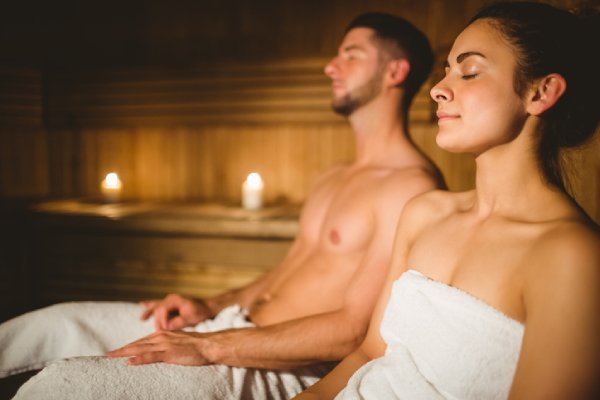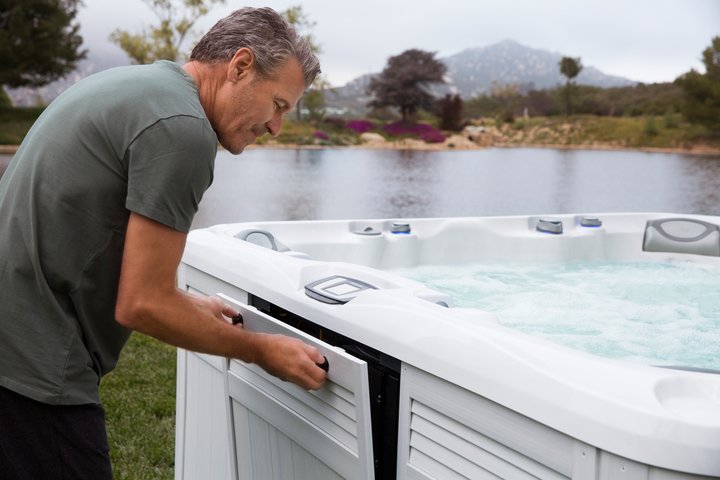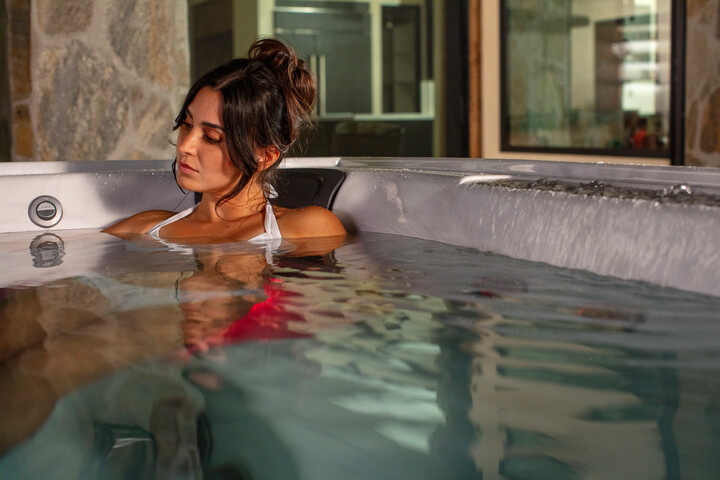Nothing beats soaking in a soothing spa when you need to relax or rejuvenate sore muscles, but no one wants to get into a tub that hasn’t been properly sanitized. So, the million-dollar question is, “what hot tub chemicals should I be using?”
Make sure you know all the facts about the hot tub chemicals you are putting into your water before you jump in, and rest easy knowing you and your hot tub are safe and clean. Below, you’ll get more information about the best spa chemicals and find out which one is better.
What Hot Tub Chemicals Should I Use?
Bromine and chlorine are the most common options for treating hot tubs. Generally, chlorine is used most often for sanitizing swimming pools, while bromine is used most often in hot tubs.
However, that doesn’t mean you should only use bromine in a hot tub or avoid treating your hot tub with chlorine. There are pros and cons to both, as well as different methods for distribution.
Is Bromine Safe in Hot Tubs?
Absolutely. As long as you follow the manufacturer’s instructions for both the hot tub and the bromine, you can use bromine regularly for treating and sanitizing your spa.
However, it may be wise to use bromine granules instead of bromine tablets. This will lessen your direct interaction with the chemicals. When a tablet is used in a floater, it remains sitting in the water until the entire tablet has dissolved.
After it has killed bacteria and other contaminants, it continues to distribute chemicals, and if there is nothing left to attack in the water, it may find another target, like the hot tub shell or spa jets. Plus, every time you get in for a soak, you’re sitting directly in chemicals.
Instead of using bromine tablets, the recommended method is to add bromine each time you finish using your hot tub.
Get out, drop in a teaspoon of bromine granules, and leave the hot tub jets running for about 15 minutes. By then, the water will be sanitary, and the chemicals will have completely dissolved.
Is Bromine Better Than Chlorine in a Hot Tub?
Both bromine and chlorine are great options for treating and sanitizing hot tubs, and each has its own benefits.
Bromine
Bromine works by ionizing contaminants in hot tub water, breaking apart their chemical bonds. It produces a waste product called bromamines, which can reduce the effectiveness of the bromine in your hot tub, but periodically shocking your tub will get rid of it. Plus, you should be shocking your tub, anyway.
Bromine is very reactive, but it’s less reactive than chlorine. That means it kills contaminants more slowly, but this does not make it less effective. In fact, bromine continues to fight bacteria longer than chlorine, so it doesn’t need to be replaced as often.
However, if the hot tub is outdoors, the UV light exposure from the sunlight can destroy bromine more quickly than chlorine, so be sure to use a hot tub cover.
The amount of bromine needed varies with the size of the hot tub, but you will most likely need to use more bromine than you would chlorine—unfortunate since bromine is also more expensive.
However, since bromine lasts longer than chlorine, it may still be the more cost-effective option.
Both bromine and chlorine are safe for your skin when used as directed, although some people can still have an adverse reaction to either.
Bromine tends to be gentler on your skin but takes longer to wash off. It is also better for people with asthma or other respiratory problems.
Chlorine
Chlorine works by oxidizing contaminants in hot tub water, basically destroying them from the inside. The waste products made from chlorine are called chloramines.
Chloramines are what cause that chlorine smell, as well as itchiness and dryness. They can also reduce the effectiveness of chlorine, which can be resolved by shocking your hot tub.
Chlorine kills bacteria more quickly than bromine but is less stable, making it necessary to replace it more often.
Chlorine can be rough on your eyes, skin, and hair. It can also exacerbate respiratory problems because the chloramines tend to hang around in the humid air above the hot tub.
Chlorine and Bromine Are Incompatible
Keep in mind that it is never a good idea to use a mixture of both bromine and chlorine. If you are currently using one and would like to switch to the other, be sure to start with completely fresh water and a clean hot tub and to conduct a thorough line flush.
For your own safety, do not mix them in the water or in their dry form. Do not store them near each other under any circumstances, because the mixture of their fumes can be combustible.
Which Hot Tub Chemicals Are Best?
The best hot tub chemicals are those that effectively treat and sanitize your spa without adverse effects. Both bromine and chlorine are great solutions. Choosing a favorite is often a personal preference, but those with asthma or sensitive skin would do better to stick with bromine.
Hot Tub Chemicals at Paradise Valley Spas
We recommend trying out our private label products branded Hot Tub Things. They have been scientifically engineered to take better care of your hot tub with over 38 years of experience going into the development of the products.
Contact Paradise Valley Spas for more information about hot tub chemicals and how to use them safely.




